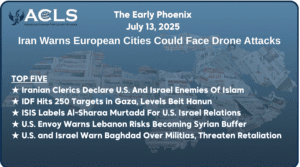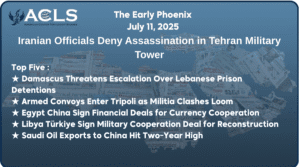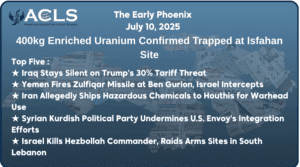2024-1-3
- Hamas and Islamic Jihad Suspend Talks with Israel After Al-Arouri’s Assassination.
Hamas and Islamic Jihad have informed Cairo of their decision to suspend negotiations with Israel regarding a ceasefire following the assassination of Saleh Al-Arouri, Hamas’s deputy leader, in an Israeli attack in southern Beirut’s suburb. The move is seen as a response to the perceived Israeli aggression, with Hamas emphasizing that such actions won’t break the spirit of resistance. - Egypt Freezes Mediation Role After Assassination of Al-Arouri.
Egypt officially informed Tel Aviv of the freezing of its role as a mediator between Israel and Palestinian factions in protest of the assassination of Saleh al-Arouri, Hamas’ deputy head of the political bureau. Following Al-Arouri’s assassination, Hamas reportedly instructed mediators to halt discussions on any ceasefire or prisoner exchange with Israel, aiming to prevent further escalation. - Sisi Emphasizes Priority of Ceasefire in Gaza.
Egyptian President Abdel Fattah al-Sisi conveyed to a US congressional delegation that the current priority is achieving a ceasefire, protecting civilians, and ensuring sufficient humanitarian aid for Gaza residents. Egypt also emphasized the importance of avoiding the escalation of conflicts in the region and holding Israel accountable for violations. - Egypt Refrains from Joining International Coalition Against Houthis.
Despite escalating conflict with Houthi rebels and their attacks on ships in the Red Sea, Egypt remains uninterested in participating in the international coalition to protect the waters. Egypt opts for a balanced stance to facilitate communication with all parties during wartime, preventing regional expansion.
2024-1-4
- Iranian Cyber Attacks Target Egypt & Africa.
A recent wave of cyber attacks targeting Egyptian telecommunications in three African countries, including Egypt, Sudan, and Tanzania, has been claimed by the Iranian hacker group “Muddy Water.” These attacks coincide with the ongoing conflict between Israel and Iran, exemplified by a similar cyber attack by an Israeli group on Iranian gas stations. Despite no official confirmation from Cairo, these incidents raise concerns about Egypt’s cybersecurity, especially considering its crucial role in the Gaza diplomatic process and as an aid corridor. Experts suggest that these attacks aim to gather intelligence and exert pressure on Egypt regarding its stance on the Gaza crisis. Iran’s use of cyber operations as a political tool has escalated since 2009, targeting communications and energy sectors in the Middle East and North America.
2024-1-9
- Egypt Strengthens Ties with Somalia Amid Ethiopian Move for Red Sea Outlet.
Egypt has swiftly responded to Ethiopia’s recent agreement with the separatist Somaliland region for access to the Berbera port on the Red Sea, a move that could stir new tensions in the Horn of Africa. President Abdel Fattah El-Sisi of Egypt affirmed support for Somalia’s unity, sovereignty, and territorial integrity, opposing any actions undermining Somali sovereignty. Following this stance, a high-level Egyptian delegation visited Somalia, meeting President Hassan Sheikh Mohamud to discuss the crisis and reinforce Egypt’s commitment to Somalia. The visit, following a strong statement from the Egyptian Foreign Ministry, underlines Cairo’s concern over regional stability and its opposition to unilateral measures that threaten the Horn of Africa. This development comes as Ethiopia, through an agreement with Somaliland, seeks a maritime outlet in the Red Sea, potentially challenging regional dynamics.
2024-1-10
- Ethiopian-Somaliland Deal Sparks Regional Security Concerns.
Ethiopia’s recent agreement with Somaliland, a separatist region, has raised significant security concerns in the Horn of Africa, the Red Sea, and for Egypt. Somalia reacted by nullifying the agreement and coordinating with Egypt and the Arab League. Dr. Abdul Rahman Badiou, a senior advisor to the Somali president, highlighted the deal’s potential to revive extremist groups like Al-Shabaab and ISIS, and its violation of Somali sovereignty. Ethiopia’s move, seen as exploiting Somaliland’s quest for international recognition, also aligns with its historical ambition for Red Sea access. The deal’s fallout includes Somali national unification and legislative actions to counteract potential conflicts in the region. Egypt has responded by supporting Somalia’s sovereignty and territorial integrity, emphasizing the deal’s potential to ignite new conflicts in the Horn of Africa. - Egypt Reinitiates Mediation in Gaza Conflict.
Egypt has officially resumed its role as a mediator between the Israeli government and Gaza’s factions, following a pause due to the assassination of Hamas’s deputy head, Saleh Al-Arouri, in Beirut. Prior to the assassination, Hamas had submitted a comprehensive response to Egypt’s initiative to halt the war, including necessary amendments for mediation. Concurrently, Qatar continues its mediation efforts to cease hostilities in Gaza. A high-level Israeli delegation arrived in Cairo to discuss the release of Israeli prisoners held in Gaza, with the resistance demanding guarantees against renewed warfare post-release.
2024-1-11
- Egypt’s Economy Gains from Israel-Hamas Conflict.
The US has approved a potential military equipment sale to Egypt, worth up to $200 million, reinforcing its status as the second-largest recipient of US military aid with $1.3 billion annually. This decision comes amid Egypt’s improving economic prospects following the Gaza war. Europe has extended unexpected loans, the IMF has softened its stance, and the US Treasury has engaged positively with Egyptian economic officials. Additionally, the American media and Congress have shown minimal opposition to arms deals. Gulf states and Saudi Arabia’s support further bolster Egypt’s economy, indicating a period of recovery and growth. - Regional Dynamics Shift Amid Egypt’s Military Upgrades and Israeli-Palestinian Tensions.
Egypt is testing India’s Akash air defense system, capable of countering various aerial threats and engaging targets up to 45 kilometers away, signaling strengthened military ties between Egypt and India. Concurrently, Israel’s Likud party faces a delicate decision about voluntary migration from Gaza, which Egypt opposes, and must address the Rafah issue, affecting its relations with Egypt. At the Aqaba Summit, Jordan, Egypt, and the Palestinian Authority strongly opposed Israeli plans for Palestinian displacement, advocating for international support of Palestinian rights and condemning Israeli aggression in Gaza. Egypt also rejects a US-proposed UN mission in Northern Gaza, perceiving it as a threat to Palestinian rights and a cover for Israeli actions. - Egypt Addresses Houthi Attacks in the Red Sea. Egyptian Prime Minister Mustafa Madbouly emphasizes the importance of maritime security in the Red Sea during a meeting with Maersk International officials. The discussion also touches on Houthi attacks and their impact on maritime security and the global economy, as well as the desire to resume Houthi maritime activities through the Red Sea and the Suez Canal for cost and time efficiency, with the Suez Canal Authority aiming to restore security in the Bab el-Mandeb area in collaboration with Maersk Group.
2024-1-12
- Suez Canal Revenue Drops 40% Amid Houthi Attacks on Red Sea Shipping.
The Chairman of the Suez Canal Authority has reported a significant 40% decrease in the canal’s revenues this year compared to 2023. This downturn is attributed to Houthi attacks on commercial ships in the Red Sea, leading to a change in shipping routes. The canal, a vital source of foreign currency for Egypt, experienced a 30% year-on-year decline in ship transit traffic, severely impacting the country’s revenues. The situation highlights the economic consequences of regional conflicts on global maritime trade routes.
2024-1-15
- China Calls for International Peace Conference to Address Gaza Crisis.
During a press conference in Cairo, Chinese Foreign Minister Wang Yi advocated for an international peace conference to address the ongoing conflict in Gaza and halt the current escalation. Emphasizing the urgent need for a ceasefire and rapid humanitarian assistance, he highlighted the plight of the two million Palestinians living under challenging conditions. In a show of support, China committed to providing emergency humanitarian aid to Gaza. These proposals were a key focus of discussions during Minister Wang Yi’s meeting with his Egyptian counterpart in Cairo. - Egypt’s Import of Israeli Gas Hits 900 Million Cubic Feet Daily, Aims for Global Export.
An Egyptian government official disclosed that in January 2024, Egypt imported an average of 900 million cubic feet of natural gas per day from Israel, primarily for re-export to international markets, including Europe. This significant volume marks Egypt’s return as a major global exporter of liquefied natural gas. Plans are underway for Egypt to increase gas imports in 2024-2025, aiming to boost its export capabilities, following a halt in exports for domestic consumption. - International Union of Muslim Scholars Plans Gaza Entry via Rafah Crossing with Egypt’s Coordination.
The International Union of Muslim Scholars has announced plans to organize a delegation to enter the Gaza Strip through the Rafah crossing, in coordination with Egypt. The Union emphasized the importance of exerting pressure to safeguard Gaza and defend Palestinian rights. Meanwhile, Egypt refuted claims of closing the Rafah crossing and accused Israel of impeding the delivery of aid to Gaza.
2024-1-18
- Egypt Confronts Dual Challenges: Renaissance Dam Impact and Ethiopian-Somaliland Agreement.
Egypt is navigating a critical juncture marked by two significant challenges: the implications of the Ethiopian Renaissance Dam and Ethiopia’s recent agreement with Somaliland. Amidst the growing concerns over the dam’s potential to reduce the Nile’s water flow, vital for Egypt’s sustenance, the Egyptian government is proactively revising its water resource strategy. This includes expanding desalination projects, enhancing groundwater extraction, and optimizing rainwater use. Concurrently, Egypt faces a geopolitical challenge as Ethiopia’s agreement with Somaliland to utilize a Red Sea port raises security and stability concerns. This development could potentially lead to an Ethiopian military presence in the region, prompting Egypt and Arab nations to assess and respond to these emerging threats through diplomatic channels, including an emergency Arab League meeting. These dual fronts underscore Egypt’s strategic efforts to safeguard its water security and maintain regional stability. - Egypt’s Suez Canal Revenue Decline Linked to Houthi Red Sea Attacks.
Egypt faces a 30% drop in Suez Canal traffic due to Houthi attacks in the Red Sea, prompting an increase in transit fees despite the reduced maritime activity. This decrease, linked to the ongoing Israel-Hamas conflict, has led shipping companies to seek alternative routes, exacerbating the economic impact on Egypt. The canal, a key global trade route, is crucial for Egypt’s economy, and the situation highlights the complex interplay between regional conflicts and international trade dynamics.
2024-1-19
- Egypt Thwarts Major Drug Smuggling Attempt.
The Egyptian military successfully intercepted a significant drug smuggling operation on its border with Israel, seizing 660 pounds or 300 Kilograms of narcotics and neutralizing three smugglers. This operation, reported on January 19, 2024, marks the second successful interception within a week. Earlier, the Egyptian army had foiled a similar attempt, leading to one smuggler’s death and six arrests. Concurrently, the Israeli army engaged in a border clash with gunmen, resulting in casualties and an injured Israeli soldier.
2024-1-24
- Sisi and Putin Inaugurate Work on the Fourth Unit of El-Dabaa Nuclear Power Plant.
Egyptian President Abdel Fattah el-Sisi and Russian President Vladimir Putin supervised the start of concrete pouring for the fourth unit of the El-Dabaa Nuclear Power Plant via video conference, reflecting deepened cooperation between Egypt and Russia. The El-Dabaa Nuclear Power Plant, costing $30 billion, is one of the most strategic projects between the two countries, including four nuclear reactors from Generation 3+ with a total capacity of 4800 megawatts. The plant aims to enhance the Egyptian economy and support modern industries, marking a key step in Egypt’s approach to diversifying energy sources and reducing reliance on fossil fuels, with the first reactor expected to be operational by 2028. The partnership between the two countries spans various fields like agriculture and energy, and Egypt is expected to join the “BRICS” group, which would enhance its strategic position in international relations. - Egypt Identifies Hamas’ Internal Divisions as Key Barrier in Gaza Peace Talks.
Egypt asserts that internal divisions within Hamas constitute the primary obstacle in the negotiations aimed at ending the war in Gaza. Egypt plays an active role in a plan supported by the United States and Qatar, with its phased negotiations taking place in Cairo. The Egyptian proposal includes the establishment of a “Gaza Reconstruction Fund” and providing security guarantees for Hamas’ political leaders. According to Egyptian officials, the split within Hamas, especially between its leaders in Doha and the movement’s leader in Gaza, Yahya Sinwar, regarding disarmament, hinders progress in the talks. The Doha-based leaders view disarmament as a crucial step post-war, while Sinwar strongly opposes this direction.
2024-1-25
- Egypt Bolsters Border Security with Gaza.
Egypt has taken significant security measures along its Gaza border, including establishing a 5-kilometer buffer zone and destroying over 1500 tunnels flooded with seawater. This move comes amid rising diplomatic tensions with Israel, as Egyptian President Abdel Fattah al-Sisi declined a phone call from Israeli Prime Minister Benjamin Netanyahu. However, professional communication continues between Israeli officials and Egypt’s head of intelligence, Abbas Kamel. President al-Sisi expressed concern about Israel’s policies in Gaza, emphasizing the need to keep the Rafah crossing open for humanitarian aid. These actions coincide with heightened security concerns in the Red Sea, highlighting Egypt’s strategic importance in the region.
2024-1-26
- Foreign Currency Shortage in Egypt Amid Red Sea Ship Attacks.
Egypt faces a foreign currency shortage due to recent Red Sea ship attacks. The disruption in Suez Canal traffic worsens the shortage, impacting government revenue from toll fees. Anticipating ongoing currency liquidity challenges, experts stress the need for exchange rate flexibility and transparent policies to boost trade and growth. They also caution against strict currency controls affecting local debt servicing.



